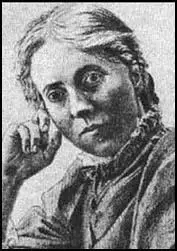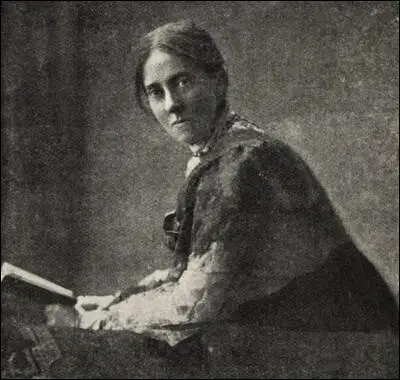Isabella Ford

Isabella Ford, the daughter of Robert Ford and Hannah Pease, was born in Leeds on 23rd May 1855. Ford came from a prosperous family from the West Riding of Yorkshire. Although a substantial landowner, Ford worked as a solicitor in Leeds. Hannah Pease also came from a wealthy family. Her grandfather, Thomas Pease, had been one of the major shareholders of the Stockton to Darlington Railway.
Robert and Hannah Ford were both Quakers and this influenced they way they raised their eight children. For example, although members of the upper middle-class, the Ford children were taught to treat the servants with "esteem, equality and friendship". Robert and Hannah Ford also believed in gender equality. Like her brothers, Isabella was taught science and history, as well as art and literature. The children were encouraged to develop inquiring minds and at home were expected to take part in discussions about current political issues.
Robert and Hannah Ford's politics were different from most other members of their class. They supported John Bright, the Quaker MP for Manchester, and his campaigns for parliamentary reform and the repeal of the Corn Laws. The Fords also supported other progressive causes such as prison reform and the protection of wild life.
The family home at Adel Grange near Leeds became a place where radicals could meet and discuss politics. As a young woman, Isabella Ford met prominent feminists such as Josephine Butler and Elizabeth Garrett Anderson. In 1875 Isabella met Edward Carpenter, a former Anglican priest who had began to question conventional ideas on politics and sexuality. Carpenter introduced Ford to socialist ideas and in 1883 they both joined the recently formed Fabian Society, an organisation which aimed to "reconstruct society in accordance with the highest moral possibilities through political means".
In 1885 Isabella helped Emma Patterson, President of the Women's Protective and Provident League, to form a Machinists' Society for tailoresses in Leeds. This was the start of a long campaign by Ford to improve the pay and conditions of women working in the textile industry in Leeds. In 1889 she established the Leeds Tailoresses' Union and the following year she was elected president of the organisation.
Isabella retained her interest in women's rights and in 1890 helped form the Leeds Women's Suffrage Society with her sister Bessie and their sister-in-law, Helen Cordelia. Three years later, Isabella was involved in forming a Leeds branch of the Independent Labour Party (ILP). The two organizations worked closely together and women such as Mary Gawthorpe and Ethel Annakin were active members of both groups. By the early 1900s Isabella Ford had developed a national reputation for her talents as a speaker and organizer. Ford was also an important writer of books on the struggle for equality. This included Women's Wages (1893), Industrial Women (1900) and Women and Socialism (1904).
In 1903 Isabella became a member of the national executive committee of the ILP. She played an important role in persuading leaders of the ILP such as Philip Snowden to support women's suffrage. Isabella argued that the emancipation of women and the emancipation of labour were strongly linked and that "socialists should support the struggle of women, just as women should support socialism."

Some suffragists disapproved of Isabella Ford's socialism but it 1907 it did not prevent her being elected to the executive committee of the NUWSS. In 1912 she upset members of the Liberal Party when she persuaded the NUWSS to support Labour Party candidates in parliamentary elections.
Isabella Ford, a life-long pacifist, was deeply concerned by the growing hostility between Britain and Germany. In the summer of 1914, Ford and Helena Swanwick helped organise a peace rally in London. Supported by the NUWSS, the Women's Labour League and the International Women's Suffrage Alliance, the rally was held on 4th August. During the meeting at the Kingway Hall they heard the news that Britain had declared war on Germany.
The women's movement was split over the issue of what role women should play during the First World War. The leadership of the WSPU was willing to do whatever was necessary to defeat Germany. Millicent Fawcett of the NUWSS urged her members to concentrate on relief work. Others like Isabella Ford and Helena Swanwick argued that the women's movement should use its energies to try and secure a ceasefire.
As the war went on Isabella found herself more and more isolated and in 1915 was forced to resign from the executive committee of the NUWSS. For the rest of her life, Ford concentrated her efforts helping the peace movement. In the years, 1919, 1920, 1921 and 1922 Ford was a delegate to the Women's International League Congress.
Isabella Ford died on 14th July 1924.
Primary Sources
(1) In 1883 Isabella Ford described her first visit to the Independent Labour Party in Colne Valley.
There was a tea party… The men poured out the tea, cut the bread and butter, and washed everything up, without any feminine help and without any accidents! A party, that included the education of men… as well as the education of women, that gave one such skill and dexterity, and the other wider and truer views of life, was the party for me I felt, so I joined.
(2) Isabella Ford explained in her booklet, Women and Socialism, why giving the vote to women would improve the quality of government.
The past subjection of women has so chastened women, so trained her to think of others rather than of herself, that after all it may have acted more as a blessing rather than a curse to the world? May it not bring her to the problems of the future with a purer aim and a keener insight than is possible for a man?
(3) In 1906 Isabella Ford wrote a book, Women and Socialism, explaining why women suffragists should also be active in the socialist movement.
The Socialist movement, the Labour movement, call it which you will, and the Women's movement, are but different aspects of the same great force which has been, all through the ages, gradually pushing its way upwards, making for the reconstruction and regeneration of Society.
(4) In 1896 Isabella Ford wrote an article entitled Why I Joined the Independent Labour Party. One part of the article dealt with the subject of women and trade unions.
Some unions excluded women, and others admitted them, mostly in order to prevent them from being blacklegs to men. 'The women must be got in because they undersell us, they injure us' - it was the old story of Rousseau and the sole object of women's education being to make women useful to men, over again. I was thinking of leaving the Trade Union movement altogether for the antagonism between men and women was widening and I could see no way of interesting women in the movement. Women resent this spirit of antagonism between them and men.
(5) In 1893 Isabella Ford wrote a book called Women's Wages. The book includes a section on sexual harassment in factories.
A premium is sometimes put on impropriety of conduct on the women's part by the foreman. That is, a woman who will submit or respond to his course jokes and language and evil behaviour receives more work than the woman who feels and shows herself insulted by such conduct, and wishes to preserve her self respect. The pittance earned by some of these women is earned at the expense of more than only hard toil. Even when this coarseness is confined to language only, it causes deep suffering to some of the women. They feel, they know, that because they are women and therefore regarded as helpless and inferior, they are spoken to as men are not spoken to, and the sting enters their souls.
(6) In her booklet, Industrial Women and How to Help Them, written in 1901, Isabella Ford attempted to show why it was so important for industrial workers to get the vote.
Certainly trade unions will never flourish amongst women, until on election days the female union voice can make itself heard alongside the male union voice… It has always been so with men; and men and women are wonderfully alike… That the improved status a vote would give these women would be a large factor in raising their wages there cannot be the smallest doubt. In the language of the girls themselves about it. They don't dare put on a man same as they do on us; not they! 'Of course not,' said a male trade unionist, 'you see men have a vote.'
(7) Isabella Ford disagreed with the Nation Union of Women's Suffrage Societies policy of support for the government during the First World War. Isabella Ford believed that women's groups should use all their efforts to obtain a negotiated peace. On 12 March 1915, an article on the subject appeared in the Leeds Weekly Citizen.
Women have more to lose in the horrible business than some men have; for they often lose more than life itself when their men are killed; since they lose all that makes life worth living for, all that makes for happiness… the destruction of the human race too is felt more bitterly and more deeply by those who through suffering and anguish have brought the human race into the world.
(8) In March 1918, Isabella Ford celebrated women over the age of thirty being granted the vote.
It is indeed wonderful when one wakes up in the morning to remember that now, at last, one is considered to be a real, complete human being! After thirty years of endeavor to make men understand they were only half the world… the price we have paid for our enfranchisement is too heavy, some of us find, to allow us to rejoice in the light-hearted, happy fashion we used to picture in old days, but we are filled with a deep and earnest thankfulness.

